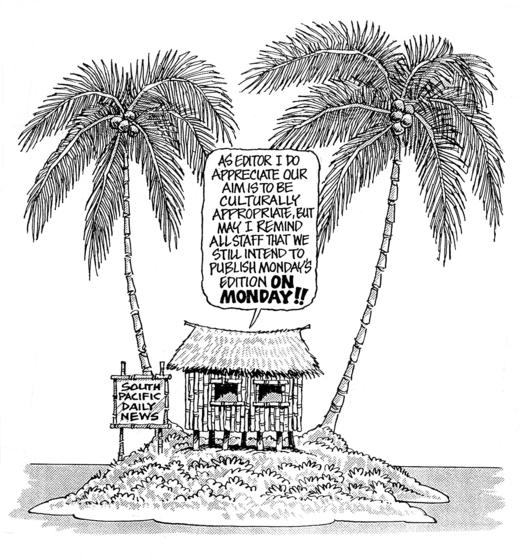Afterword
If you have read all 73 chapters of The News Manual Online, we congratulate you! We hope you have enjoyed reading it all, and we hope that you have learned some new things.
The next stage is for you to put these new things into practice. It is not enough to learn new ideas in your head: you have to demonstrate the new ideas in your actions. You must be ready to do things differently, to change and to improve.
If you have read the whole book, and if you live in a developing country, you will have noticed that it is culturally biased. We apologise for this.
The authors were both English by birth and upbringing. That is our culture. That is where we learned to be journalists. While it is true that we have lived and worked in many different countries and are aware of their different needs, that is our experience, not yours.
As you continue to use The News Manual Online, therefore, you will need to sort out the content of what we are saying from the cultural setting in which we say it. The things we have to say are like a liquid, and our culture is the like the cup which holds that liquid. You must pour the liquid out of our cultural cup and into your own.
This is the challenge facing journalists in developed and developing countries. You may wish to look at how things are done in other countries, in order to improve the standard of journalism in your own country. But you do not necessarily want to adopt other countries' style of journalism.
A good example of this is in the pace of broadcasting. In most Western countries, news and current affairs on radio and television has to maintain a fast pace. Each item is kept short, people speak quickly and no long silences are allowed. If the pace drops, it is considered to be bad broadcast journalism.
In most Pacific islands, though, the pace of life generally is more relaxed. If the radio news in these countries was presented at the pace of an American commercial radio station, it might seem strange to the listeners. In this case, the difference is not in standards, but in style.
Unfortunately, the difference between standards and style will not always be so easy to see. "That is our cultural style" can be a way of saying "I can't be bothered to do it better". But there is also a real danger that, in an attempt to do things better, you may adopt ways which are inappropriate for your society.
It may not be an easy process to work out a style of journalism with high professional standards which is appropriate for your society. It may not be easy, but it is a job which you must do yourself. Nobody from outside your country, your society, your culture can do it for you.
Do not be afraid of making mistakes as you develop this appropriate style. You will have to make some. Accept people's criticism graciously, and think about what they have to say. If their criticism is justified, apologise and change the way you do things in future. If it is not justified, explain to them why not, and have the courage to continue doing what you believe to be right.
This is the essence of good journalism in any society. It is the desire to serve the community, fairly and honestly, by providing the information which they want and need.
We believe that it comes down to six golden rules. If you can live by them, you will be a good journalist.
GOLDEN RULES:
Be a professional person; this means:
-
Understand why journalism is important
-
Learn and understand the knowledge and skills which you need
-
Learn and understand the ethics of journalism
-
Conduct yourself at all times in a proper way
-
Be humble, and remember that you are only a channel through which information flows
Be aware of the world around you; this means:
-
Read newspapers and magazines, from overseas as well as from your own country
-
Listen to radio and watch television, especially news, current affairs and documentaries
-
Read books
-
Talk to educated and informed people.
For every story you report, ask the key question: "How will this affect my readers' or listeners' lives?"
Make sure you understand a story before you try to report it; do not pass on your own confusion to your readers or listeners; remember to visualise the whole story in detail.
When you are interviewing anybody, be polite but persistent.
When you are writing a story, KISS (Keep It Short and Simple).
___________________________
And finally, we leave you with this gift from Bob Browne, to ponder and enjoy:

